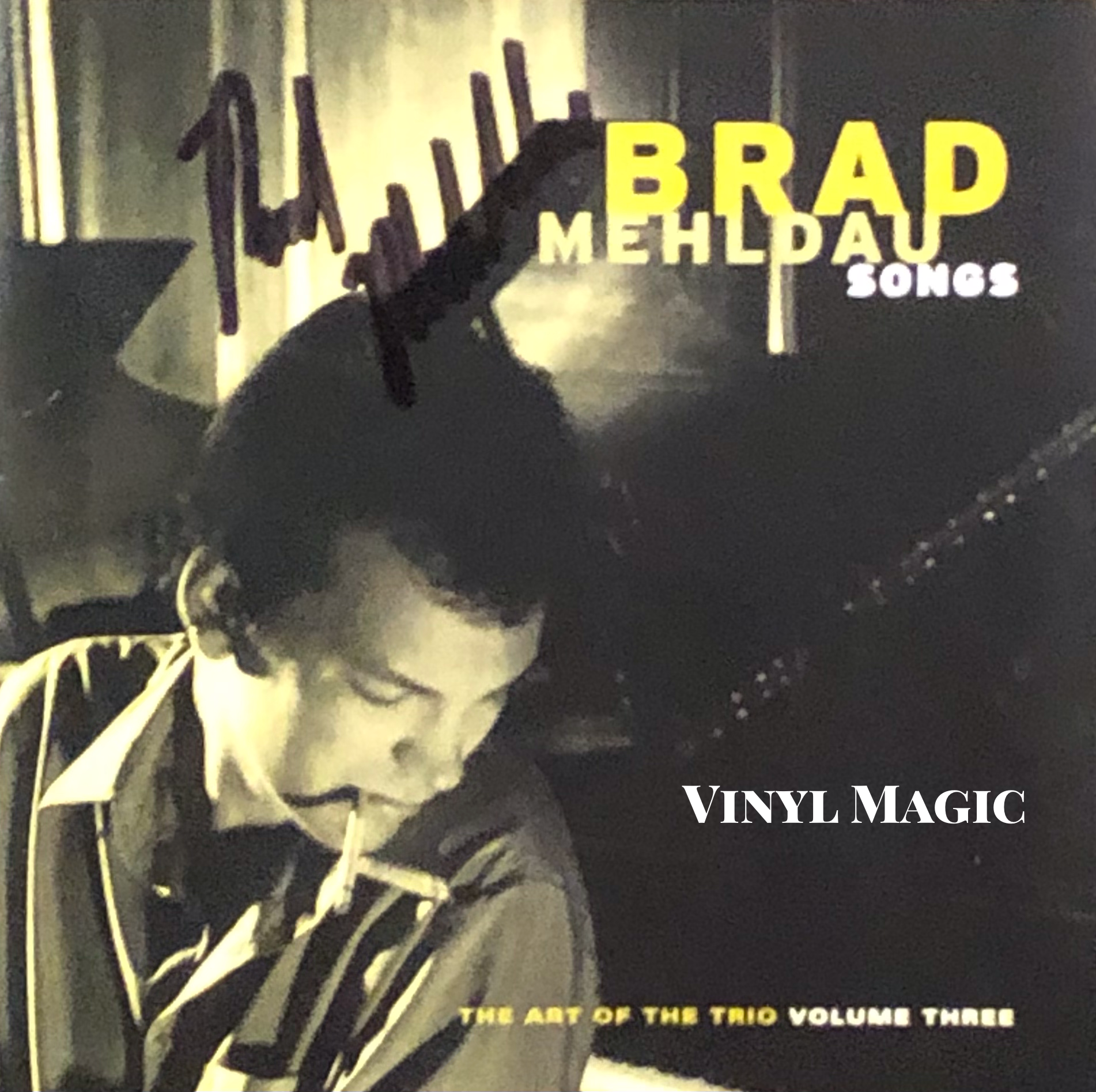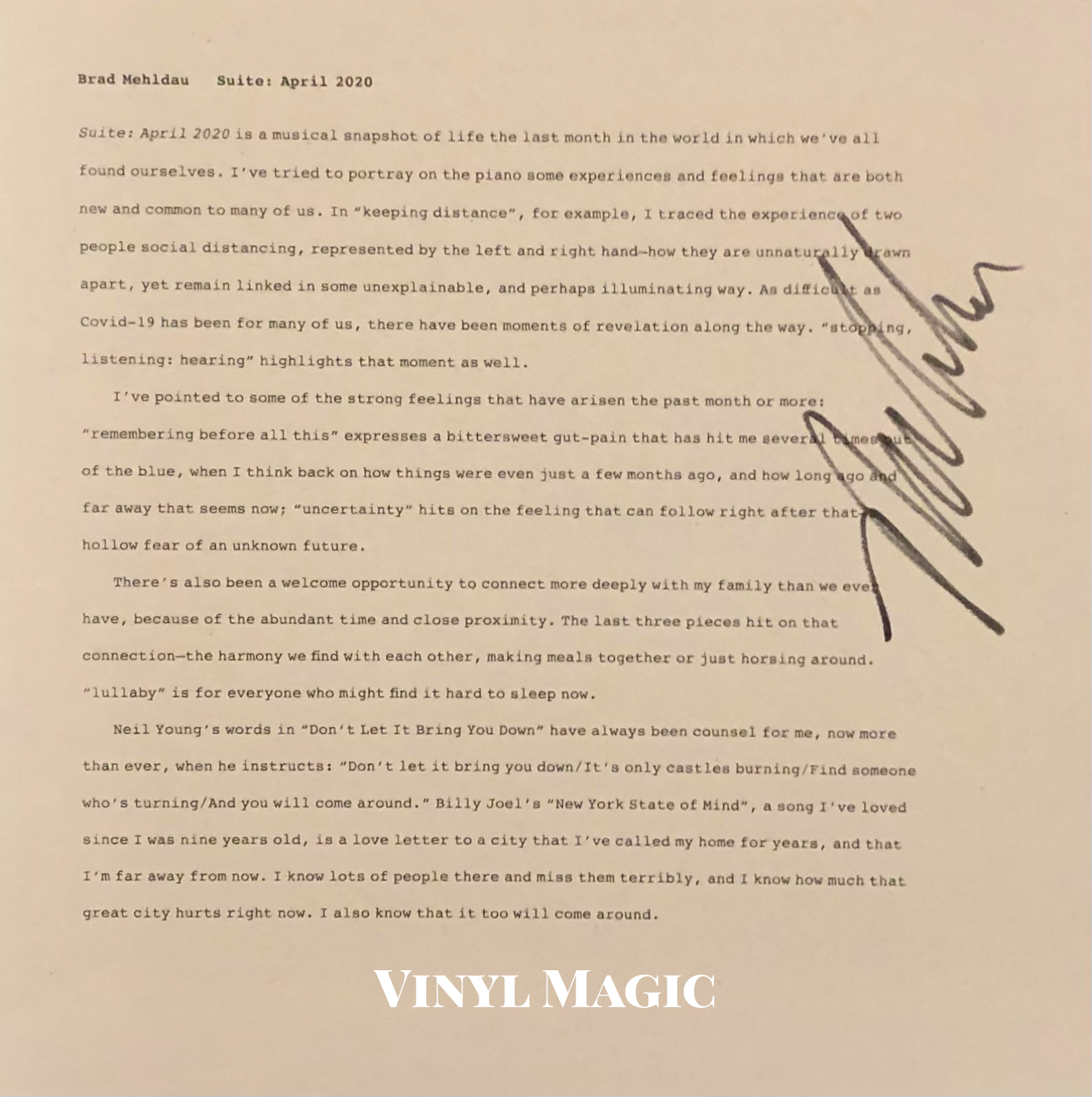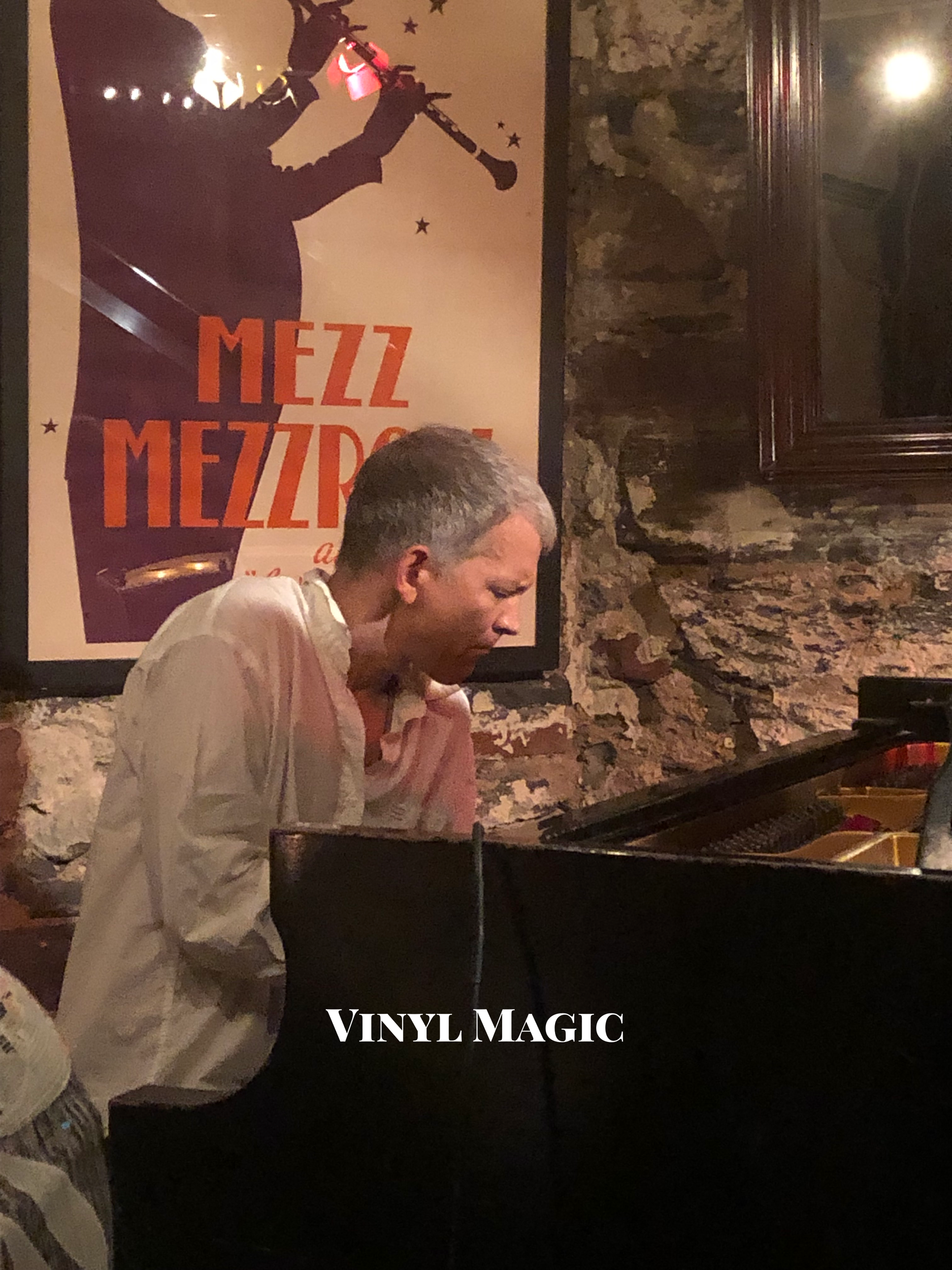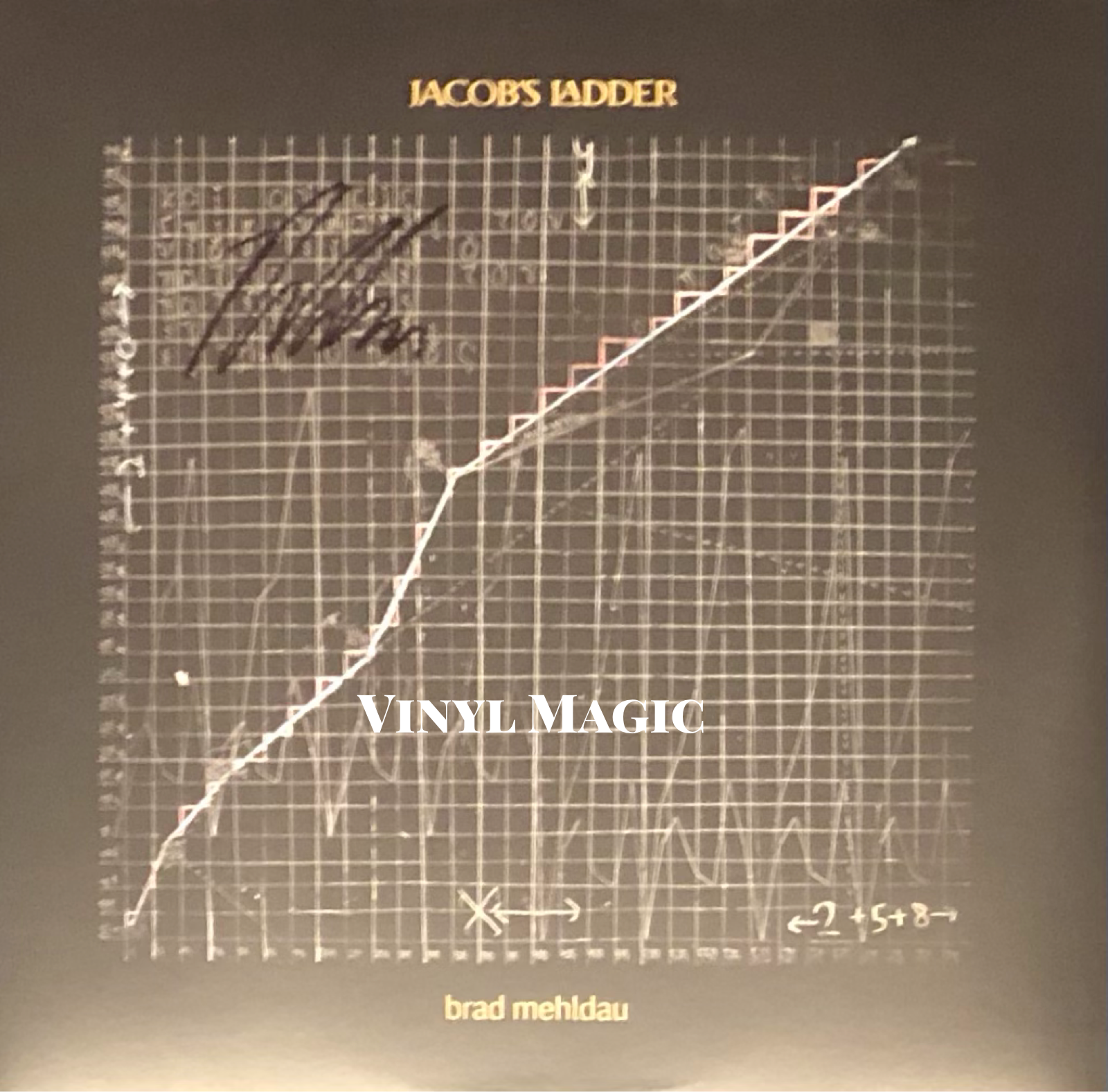Brad Mehldau and Me…
Improvisation is one of the big things I use in my own definition of jazz. You have the ability to make a pretty intricate narrative, to play around with time itself, like a novel does, and your memory, and your expectation of what's taking place. Monk is doing that, Wayne Shorter, Coltrane. Most of my jazz heroes have that narrative aspect. Improvisation usually implies something very non-intellectual at its core, because when it's really working it has a real flow, it's in the moment. But if I listen to Coltrane, he's in the white heat of the moment, but there's also intricacy and complexity; you can enjoy it as a piece of art the same way you enjoy the compositional rigor of a Beethoven symphony or a Bach fugue. And then (you remember) it's being improvised. I think that's what appealed to me as a kid. Why you respond to something like a great Coltrane solo; to what extent you can map that is an interesting question. And particularly for jazz - it's a little less mapped, a little less written about than classical music, which has been a canon for such a long time. It's a little more open.
Brad Mehldau
Ballads And Blues (2014) signed by Brad
The challenge and the thrill are one and the same - there is no net; there is absolute freedom. When jazz musicians improvise in a group setting, they are often following some sort of schema - often it’s variations on the initial theme of whatever they are playing. When you are playing solo, you don’t have to correspond to what someone else is doing. So you might take that approach, but you might decide to chuck it out at a certain point and go off on a tangent that doesn’t formally adhere to what you’ve just been doing. That can be exciting and rewarding. The challenge there though is to make something with integrity - something that has a story to tell.
Brad Mehldau on the art of playing solo
The Art Of The Trio Volume Two (1997) signed by Brad
I was not really sure what I wanted to do because there is always so many different options for a recording. The way it went down was playing at The Vanguard once before with my own trio, I felt a special affinity for that place and a real inspiration that came from playing that room, because of the audiences that are there and the kind of intensity that they have when they’re listening. The room itself, for the kind of music we play, and most people feel that way, acoustically, it is so wonderful because you can hear everything perfectly. So there’s all sorts of subtleties that get lost a lot when you play in other venues, like a festival or whatever. Of course, playing live is a totally different thing than trying to create something in the studio. I asked Matt Pierson, the producer, if I could record the whole week and put it out and he said yes. Then, I just knew I wanted to do it, just because I had the opportunity to. Because, for me, if I had the option in a perfect world, I would make every album live and just put five or six songs on there. Those are my favorite albums, Miles Davis At The Plugged Nickel or Blackhawk or Coltrane At Birdland, where you hear them getting into that place they get when they’re allowed to stretch out and there’s no constraints. The music gets transcendental for me.
Brad Mehldau - recording at the Village Vanguard
The Art Of The Trio Volume Three (1998) signed by Brad
I have several ideas before I go out on the stage, and I usually stick to around half of them. Some things that I thought I would play I don’t when I get on stage because of what takes place when I get out there. For instance, if I play something that goes much longer than I originally intended, I will skip something else. I try for variety and often think of a multi-movement symphonic work or sonata as a model - you’ve usually got one movement that’s more intellectual, one that’s more simple direct, one that’s fast, one that’s slow, one that’s in 3/4 time maybe, etc. - in other words, a variety of mood and texture. In all that, as I’m going along, there is some sort of abstract narrative that presents itself in a concert - I don’t know how else to put it. Sometimes it will come in the form of themes that reappear in the different tunes I’m playing, or harmonic devices, or rhythmic motifs. That presents itself in the act of playing; it’s not something that is planned out.
Brad Mehldau
Suite: April 2020 (2020) signed by Brad
The piano itself is endlessly expressive as an instrument, but it's also rewarding to think more as an orchestrator---to think about ways of organizing sound. Many of the musicians or composers I am influenced by are great orchestrators as well, and I suppose their influence rubs off on me. Brahms seems to be one that I myself notice at least—I always see his music peeking out in what I write. It’s what one of his biographers described as “smiling through tears.” I like a bleeding heart that holds itself in check a bit—that kind of German Romanticism, not all in your face.
Brad Mehldau
Finding Gabriel (2018) signed by Brad
New York City is the greatest city in the world and it's not even close. Notwithstanding the politics, the peril, the naysayers, the nattering nabobs of negativity, no matter the turmoil and sturm und drang which the city endures, it always prevails. It simply does. Exhibit A in my ongoing love affair with all things New York was a recent visit to Mezzrow, a piano listening room on West 10th Street in Greenwich Village, just a couple of blocks from the hallowed and sacred Village Vanguard. On a summery, wind swept Monday night in August, the virtuoso jazz pianist Brad Mehldau performed a solo recital for fifty lucky souls. It was an extraordinary experience.
Seymour Reads The Constitution! (2018) signed by Brad
When I initially stumbled across the announcement for the concert online, I thought it was a mistake. Perhaps it was a streaming only concert, not an actual live performance. After all, Brad was more accustomed to playing concert halls, like the Concertgebouw in Amsterdam, Symphony Hall in Boston, or Carnegie Hall in New York City, not a creaky, dimly lit basement room in Greenwich Village. With skepticism, I bought a ticket and hoped that it wouldn't get canceled, checking almost daily to see if my hopes would be dashed. They weren't.
When I got to the club, a small line of patrons gathered outside the venue and soon I was ushered to my seat, maybe five feet from the grand piano which filled almost the entirety of the stage. A brick wall served as the backdrop and there didn't seem to be much amplification, nor was any needed. Mezzrow is the genius of pianist Spike Wilner, who founded the club in September 2014, a piano room offshoot of Smalls, a well known jazz club since its resurgence in 2004. The club was named after a very colorful character in jazz - Mezz Mezzrow.
Largo (2002) signed by Brad
Mezz Mezzrow, born in Chicago in 1899, was in and out of reform schools and prison while developing a passion for jazz and playing clarinet, especially influenced by the music of his hero Louis Armstrong who was based in Chicago at the time with his fabled Hot Five. In 1933, Mezz's orchestra recorded with jazz luminaries Benny Carter, Teddy Wilson and Willie "The Lion" Smith, the first of approximately one hundred-fifty sides which Mezz helmed with other jazz legends including Art Hodes and Sidney Bechet. While his clarinet skills were pedestrian and lackluster, Mezz was probably best known as a prolific marijuana dealer, with Louis Armstrong his best and most devoted customer. His business exploits were so ubiquitous that ‘Mezz' became slang for marijuana, an important and essential addition to the 1930s hipsters’ lexicon. Thus, the club Mezzrow is a fitting tribute to its namesake who devoted his life to jazz and pleasing others. Still, it was a remarkable and unlikely venue for a Brad Mehldau performance, certainly one of the preeminent and influential pianists extant.
Born in Jacksonville, Florida in 1970, Brad was ten when the Mehldaus moved to West Hartford, Connecticut. Brad’s father was an ophthalmologist, his mother a homemaker, and a piano was a constant presence in their home. He was soon smitten with Jazz, “I started out as a kid playing classical piano and listening to rock. When I first heard jazz when I was eleven or so, it seemed to have something from both of those types of music, but something even more - a deep feeling of dance rhythm and the blues, and also the kind of virtuoso display that I associated with classical piano players that I admired."
Round Again (2019) signed by Brad
The proximity to New York City. proved an inescapable and powerful lure, "I knew that I wanted to come here because it was everything that the suburbs wasn't. I was a white, upper-middle-class kid who lived in a pretty homogenized environment. Yet I was with a couple of other people, like Joel Frahm, the tenor saxophonist, who went to the same high school as me. A group of us were trying to expose ourselves to jazz. So New York for us was sort of the Other, yet it wasn't too far away, a two hour-and fifteen minute car or bus ride. What really cemented me wanting to go to New York was when I came here with my folks during my senior year of high school, and we went one night to Bradley's, and heard the Hank Jones-Red Mitchell duo. That blew me away, seeing someone play jazz like that, about six feet from you. The next night I heard Cedar Walton...with Bobby Hutcherson, Billy Higgins, Ron Carter and Harold Land, small ensemble jazz. The immediacy of hearing Billy Higgins' ride cymbal and seeing Cedar Walton comping, after hearing it for three years on all those great Blue Note records I had. That was it. I knew I had to come here, just from an actual visceral need to get more of THAT as a listener."
Alone Together (1996) signed by Brad
When he graduated from high school, Brad enrolled at The New School in New York City and he had the great fortune to study with some jazz piano masters. Brad remembered, "I had some very good lessons at The New School with Kenny Werner and Fred Hersch, and Junior Mance was my first teacher there. He was a little different than Fred and Kenny. Fred concentrated on getting a good sound out of the piano and playing solo piano a lot, which was great, because I hadn't got there yet. Perfect timing. Kenny showed me ways to construct lines and develop my solo vocabulary specific harmonic stuff. With Junior, it was more that thing I described of soaking it up by being around him. We would play on one piano, or if we had a room with two pianos, we'd play on two. I said, 'I want to learn how to comp better. I listened to you on these Dizzy Gillespie records and your comping is perfect. How do you do that?' He said, "Well, let's do it." So we sat down and he would comp for me, and then I would comp for him and try to mimic him. Yeah, soak up what he was doing. Junior is a beautiful person. A lot of those guys to me still are models as people, for their generosity as human beings, and Junior is certainly one in that sense." Brad was able to soak up those invaluable lessons and, after playing with fellow rising star saxophonist Joshua Redman for eighteen months, Brad formed a trio and was signed by Warner Brothers releasing Introducing Brad Mehldau in 1995. Since then, more than thirty albums have followed including collaborations with revered jazz artists Charlie Haden, Charles Lloyd, Lee Konitz and Wayne Shorter as well as sessions with Daniel Lanois, Willie Nelson, Chris Thile and Allen Toussaint.
Your Mother Should Know (2023) signed by Brad
As eclectic and diverse as that list may be, Brad's real genius is broadening the Great American Songbook to include not only Duke Ellington, Cole Porter, Jerome Kern, Thelonious Monk and Richard Rodgers but also The Beatles, Kurt Cobain, Nick Drake, Bob Dylan and Radiohead. In Brad's deft hands, these melodies become virtuosic explorations and unparalleled sonic excursions. As Brad once said, "I don't make a distinction between genres, I just write and play what I'm feeling. Music in itself doesn't have genres. It's just twelve different tones and how you arrange them in a given point of time."
Long Gone (2022) signed by Brad
Erin and I have been blessed to see Brad many times over the years, as a solo artist, with his trio, and as a sideman supporting his great friend, guitarist Peter Bernstein. The shows were always inspiring, especially with his jaw dropping talent. The gig at Mezzrow was just as rewarding, probably more so given the intimacy of the venue. At the start of the show, Brad sat down at the piano and said, “it’s really great to be back in New York. I’m not going to say a lot about what’s happened, we’ve all experienced the loss. All I can say is, I’m really happy to be here playing for you.” He wasn’t the only one exultant!
Chris Thile & Brad Mehldau (2017) signed by Brad
Brad opened with a melodic “Here, There, Everywhere” from the Lennon/McCartney songbook which segued seamlessly into Dylan’s “Don’t Think Twice, It’s Alright.” Next came “Go To Sleep” by Radiohead and a gorgeous and soulful “Golden Lady” from the pen of Stevie Wonder. Other highlights were an appropriately dissonant “Skippy” by Thelonious Monk, an extended and an appropriately overwrought “Come Rain Or Come Shine” and “Dis Here” by the great soul jazz pianist Bobby Timmons. He finished with more Radiohead, “Little By Little,” exquisitely rendered. Unlike some jazz artists, Brad announced the names of the songs near the end of his program which was appreciated given how much he deconstructs and reinvents the melodies. He also said, “You all are so close, it’s freaking me out.” I think he was kidding. Maybe.
Jacob’s Ladder (2022) signed by Brad
After the show, I met him near the club entrance. I told him what a thrill it was to see him in such an intimate venue having seen him at much larger spaces over the years. ‘This is extraordinary,’ I gushed. “Thank you. You know, Spike (Wilner) is an old friend and I’m really happy to be here.” I handed him some vinyl to sign and told him how excited I was to have some of his music finally on vinyl instead of CDs. “Yes, my label Nonesuch is big on vinyl,” he replied.‘Have you ever heard anything from Thom Yorke or Johnny Greenwood from Radiohead on your treatments of their songs? I mean, they’re very talented songwriters, no doubt, but you’re a virtuoso,’ I asked. “That’s very kind of you to say. Actually, I do know their producer Nigel Godrich and he’s told me they really like what I do with their songs.” I couldn’t resist a shameless Tom Waits plug, ‘You know, I heard you cover Tom Waits on a sketchy bootleg awhile back. I’d love to hear you reinvent some of his songs.’ Brad smiled, “Oh yeah, I did ‘Martha,’ that’s a nice little tune, a beautiful melody.” I saw an opening, ‘You know, you could do a lot with his songs, “Take It With Me,” “Picture In A Frame,” Invitation To The Blues,” those all have great melodies. You could do a lot with them,’ I persisted. “ You know,” Brad said, “his songs are so lyrically driven, they may overshadow the melodies, but they have that melancholy which is essential.” Yes, the Celtic melancholy which inhabits my soul, perhaps one day he will explore Waits! I thanked Brad for his time, talent, generosity and especially his transcendent music.
Brad Mehldau, a jazz master and a gifted songwriter with impeccable taste. Not many can master Bach, Brahms, The Beatles, Dylan, Nick Drake, Nirvana, Radiohead, Stevie Wonder and Thelonious Monk with equal aplomb and conviction. Just arranging twelve different tones and smiling through tears!
Atlantic Jazz (1982) signed by Brad, Dave Brubeck, Ray Bryant, Kenny Barron, Tommy Flanagan, Sir Roland Hanna, Barry Harris, Hank Jones, Dwike Mitchell, Junior Mance, Andre Previn, Horace Silver, Billy Taylor, McCoy Tyner, Chucho Valdes
Atlantic Jazz Piano back cover signed by Monty Alexander, Roger Kellaway, Harold Mabern, Gonzalo Rubalcaba, Randy Weston
Choice Brad Mehldau Cuts (per BKs request)
https://www.youtube.com/watch?v=_k9bzHNfRCk
“I’ve Grown Accustomed To Her Face” Anything Goes 2004
I wake up every day to this beautiful song, you should too!
https://www.youtube.com/watch?v=0zBQ52LxWWA
“River Man” Brad plays Nick Drake live in SF
https://www.youtube.com/watch?v=YvMaC63vdao
“She’s Leaving Home” Day Is Done 2005
https://www.youtube.com/watch?v=3_JqOlHHiWc
“Bittersweet Symphony > Smells Like Teen Spirit” Brad plays The Verve and Nirvana 2010
https://www.youtube.com/watch?v=i6Fk5OMKy7w
“When It Rains” Brad plays Brad Largo 2002
https://www.youtube.com/watch?v=vc0UiB7FvqI
“Song Song” The Art Of The Trio Volume 3 1998
https://www.youtube.com/watch?v=1F3J5BrPtqM
“Moon River” The Art Of The Trio Volume 2 1998
https://www.youtube.com/watch?v=jpF0qKQ4WeE
“And I Love Her” Brad plays The Beatles 2016
https://www.youtube.com/watch?v=5GNuMfQ1N0g
“Tear Drop” Brad plays Massive Attack! Live 2010
https://www.youtube.com/watch?v=GrQGKHZ5KmE
“Hey Joe” Brad channels Jimi Hendrix 2012
https://www.youtube.com/watch?v=D-P679ZcwAg
“Little By Little” Brad plays Radiohead 2018
https://www.youtube.com/watch?v=2bCueJXqLYQ
“Dear Prudence” Largo 2002
https://www.youtube.com/watch?v=77gJ-s9hDp4
“Stranger In Paradise” live at Smoke, Brad, Peter Bernstein, Jimmy Cobb, John Webber
Bonus picks:
https://www.youtube.com/watch?v=_5Ye4m3bPQ8
Brad Mehldau livestream, Mezzrow 9 August 2021 first set
Thanks, luv and much respect to Spike Wilner and the gang at Mezzrow for their tireless and amazing efforts!
Sitting in with Brad, “Where Do You Start” written by Johnny Mandel, Smoke, NYC August 12, 2023 early show, with Larry Grenadier and Joe Farnsworth

















